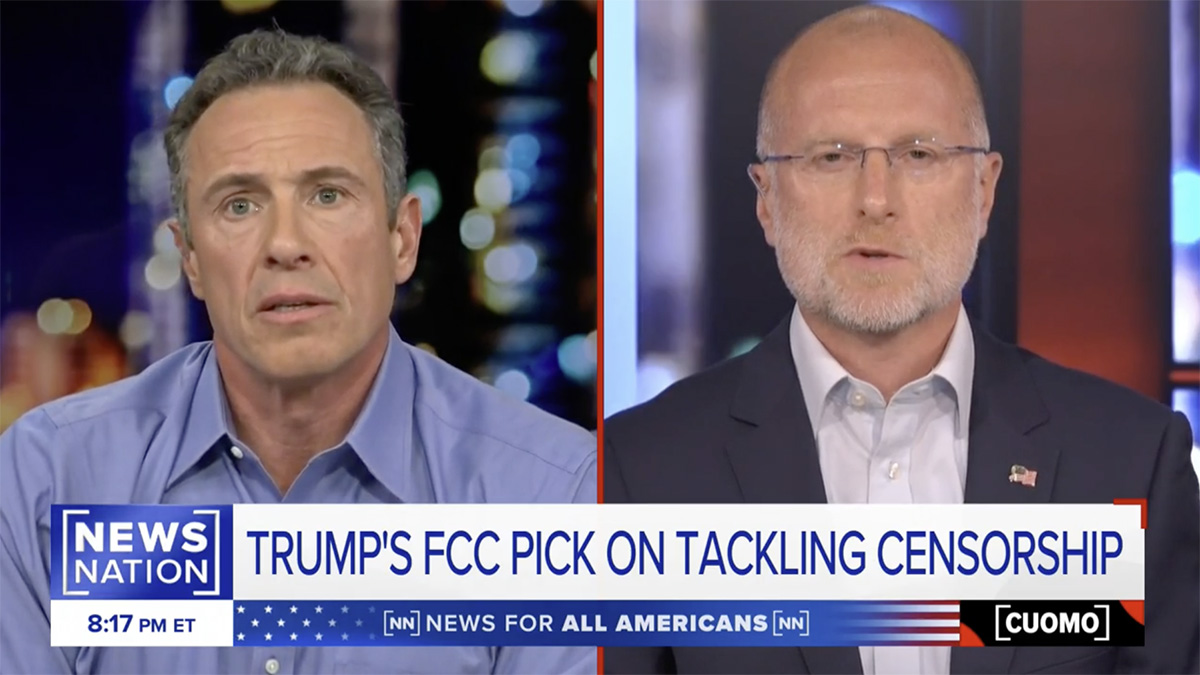FCC nominee Carr outlines plans to address content moderation, smash ‘censorship cartel’

Subscribe to NCS for the latest news, project case studies and product announcements in broadcast technology, creative design and engineering delivered to your inbox.
Brendan Carr, President-elect Donald Trump’s nominee for Federal Communications Commission chair, said he plans to examine content moderation practices and broadcast regulations if confirmed to lead the agency.
“I think Americans have been seeing an unprecedented surge in censorship, particularly over the last couple of years,” Carr said. “Any time you have an increase in government control, you necessarily have a decrease in free speech.”
In an interview on NewsNation’s “Cuomo” on Dec. 2, Carr identified technology platforms, government officials and advertising agencies as entities he says are restricting speech. The commissioner said dismantling what he termed a “censorship cartel” would be among his top priorities if confirmed to lead the agency.
“Diversity of opinion is so important in this country, and it’s going to be one of my top priorities, trying to smash this censorship cartel,” Carr said.
“Trying to draw the lines between disinformation and misinformation is very fraught,” Carr said. “More often than not, people are slapping those labels on political speech they disagree with.”
Carr said he would review Section 230 of the Communications Act, which provides legal immunity to online platforms for user-generated content and content moderation decisions. The provision contains two key components: protection for platforms hosting third-party content and guidelines for content removal.
“The problem is a second portion of [Section 230] which says that these social media companies can censor, not just consistent with the First Amendment,” Carr said. “Courts have read immunities into that takedown provision that are found nowhere in the statutory text.”
Regarding traditional broadcasting, Carr emphasized broadcasters’ legal obligation to serve the public interest while noting declining trust in media institutions. He referenced recent comments from Amazon founder Jeff Bezos about challenges facing traditional media.
Beyond social media regulation, Carr indicated support for broadcast deregulation, particularly regarding ownership restrictions.
During his tenure as commissioner, Carr opposed the FCC’s handling of the proposed Tegna-Standard General merger, arguing the extended review process could hinder broadcasters’ ability to compete with technology companies.
The nominee also expressed support for accelerating broadcasters’ transition to the ATSC 3.0 broadcast standard, known as NextGen TV. Speaking at an Advanced Television Systems Committee meeting in June, Carr advocated for a market-based approach similar to the cellular industry’s 5G implementation.
The National Association of Broadcasters endorsed Carr’s nomination Sunday, praising his stance on technology company accountability. However, Craig Aaron, co-CEO of advocacy group Free Press Action, warned that Carr’s nomination could affect the FCC’s public interest mandate.
Carr’s nomination follows traditional practice of elevating a commissioner from the incoming president’s party to chair, as occurred with Ajit Pai in 2017 and current Chair Jessica Rosenworcel in 2021. The FCC operates as an independent agency overseen by Congress.
Subscribe to NCS for the latest news, project case studies and product announcements in broadcast technology, creative design and engineering delivered to your inbox.





tags
Brendan Carr, Deregulation, FCC
categories
Broadcast Business News, Broadcast Industry News, Heroes, NextGen TV, Policy